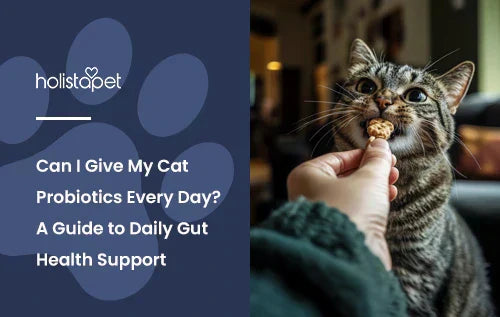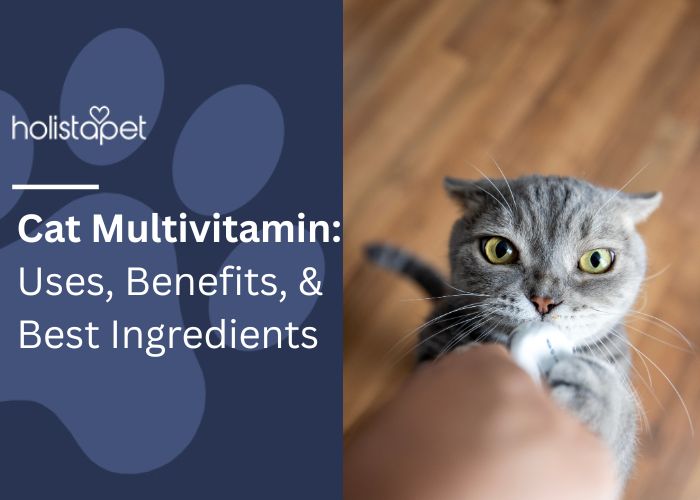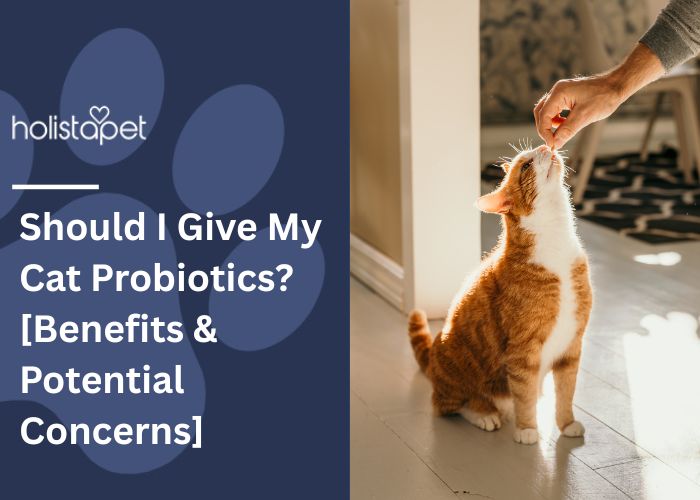"Can I give my cat probiotics every day?" Absolutely! Daily probiotic intake can seriously boost your kitty's gut health and keep them feeling great. You see, to stay in top shape, our feline friends need a well-balanced digestive system packed with healthy bacteria.
When you add probiotics to your cat's diet, you help keep their gut bacteria in check, especially during tricky times (we're talking stomach upset or post-antibiotic treatment). Stick around to learn how probiotics work and how easy it is to make them part of your pet's everyday routine.
What Are Probiotics for Cats?

Probiotics for feline pets are live microorganisms that support your cat's digestive health. They do so by balancing healthy and unhealthy gut bacteria. These beneficial bacteria help improve digestion, reduce digestive upset, and support immune health.
Probiotics reside naturally in the feline digestive tract, but factors like dietary changes, illness, or antibiotic use can mess up this balance. In such cases, additional probiotics can help restore healthy gut bacteria, improving your cat's digestion and beyond.
Can I Give My Cat Probiotics Every Day?
You can give your cat probiotics every day, but it depends on their specific needs. Many veterinarians recommend probiotics for daily use to support smooth digestion and maintain healthy gut bacteria. This is especially true for felines that frequently experience digestive upset. Keep in mind: It's important to choose probiotics formulated for cats and to follow your vet's instructions to avoid going overboard.
How Often Should Cats Have Probiotics?
Some cats benefit from taking probiotics daily, especially those with chronic digestive problems or weakened immune systems. Others might only need probiotics during or after stressful events, antibiotic treatments, or dietary changes.
For healthy adult cats, a weekly probiotic dose or occasional supplement can help maintain a balanced gut. The trick is matching probiotic use to your kitty's unique needs and, of course, following your vet's advice for the best routine.
When Should I Give My Cat Probiotics?
The best time to administer probiotics is usually during mealtime. Food helps protect the live bacteria as they pass through your cat's stomach, improving their chances of reaching the gut.
Probiotics also come in handy during stressful events like travel, vet visits, or changes in environment. Giving them then can help ease digestive upset and support your cat's immune system when they need it most.
Signs Your Cat Might Benefit From Daily Probiotics

If your cat shows signs of digestive trouble or other health problems, daily probiotics might help. Keep an eye out for these signals:
- Digestive Problems. Frequent diarrhea, loose bowels, constipation, gas, bloating, or vomiting unrelated to hairballs can mean your cat's gut bacteria are out of whack.
- Changes in Appetite or Weight. Sudden loss of appetite, unexplained weight loss, or new picky eating habits might signal gut imbalance.
- Skin & Coat Problems. Itchy, flaky skin, dull coat, or excessive shedding could point to gut issues.
- Signs of Immune Imbalance. Frequent sneezing, recurring infections, or slow wound healing may indicate immune challenges.
- Stress-Related Behaviors. Overgrooming, hiding, or litter box accidents might also improve with probiotics. Pro tip: CBD products, like HolistaPet's CBD collection for cats, can further ease anxious behaviors. Our CBD chews, treats, oils, and capsules work with felines' internal systems to promote calm and emotional balance.
- Post-Medication or Illness Recovery. After antibiotics, surgery, or major life changes, probiotics support gut and immune recovery.
Short-Term vs. Long-Term Probiotic Use
Probiotic use can be for short-term or long-term periods, depending on your kitty's needs. Short-term use often helps during digestive upset, antibiotic therapy, or after illness. Long-term use supports ongoing gut balance and immune health.
|
Use Type |
Duration |
Purpose |
Dosage Considerations |
|
Short-Term |
Days to weeks |
Support recovery, reduce upset |
Follow vet's recommendations |
|
Long-Term |
Weeks to months or more |
Maintain gut health and immunity |
Consistent daily dosing advised |
Different Types of Probiotics for Cats
Probiotics for cats come in several forms, each with its own beneficial effects. Choosing the right one depends on your pet's preferences and your daily routine. Choose from these different types:
- Powders. Easy to sprinkle over cat food for flexible dosing.
- Capsules. Convenient and often higher concentration of probiotic strains.
- Treats. Probiotic chews and crunchy bites are tasty and simple to give. Great for picky cats.
- Oils. You can add these to food or give them directly. Often combined with other pet supplements.
The best probiotics for daily use are treats and powders. Treats make intake easy and enjoyable for your kitty, while powders offer flexible dosing that fits smoothly into meals. Both forms deliver beneficial bacteria consistently without hassle.
Ingredients To Look for in a High-Quality Cat Probiotic
When choosing a probiotic for your cat, check for some key ingredients. Quality options combine these components to support your cat's digestive system and immune health effectively:
- Prebiotics. These feed the good bacteria and help them thrive in your cat's gut. Look for sources like inulin or fructooligosaccharides (FOS).
- Strain Diversity. A mix of probiotic strains, like Lactobacillus and Bifidobacterium, boosts effectiveness by targeting different parts of digestion.
- Digestive Support Additions. Ingredients like digestive enzymes or amino acids can help enhance gut health and improve nutrient absorption.
How To Introduce Probiotics Into Your Cat's Daily Routine

Introducing probiotics to your cat should be smooth and stress-free. Following these steps helps them adjust comfortably and get the most benefit:
- Start with a small dose mixed into their food to see how they react.
- Gradually increase to the recommended amount over a few days.
- Give probiotics consistently at the same time each day, ideally with meals.
- Watch for any changes in digestion or behavior and adjust if needed.
- Consult your vet if you're unsure about dosage or product choice.
Are There Any Risks to Daily Probiotic Use for Cats?
Daily probiotics are generally well-tolerated, but there are some rare risks to keep in mind. Giving too much can cause digestive upset, like loose stools or gas.
Also, avoid human probiotics or products not made specifically for cats. Such products may contain strains that don't suit your feline friend. Always follow dosing instructions and consult your vet before starting daily use to guarantee safety and effectiveness.
Signs That You Are Giving Too Much Probiotics to Your Cat
Giving your kitty too many probiotics can cause unwanted side effects. If they show any of these red flags, it's time to adjust their probiotic use:
- Upset Stomach or New Digestive Issues. Loose stools, diarrhea, vomiting, or extra gas soon after probiotic doses.
- Appetite or Behavior Changes. Loss of interest in food, lethargy, irritability, or restlessness after meals.
- Increased Litter Box Accidents. More frequent bathroom trips or trouble controlling bowel movements.
- Allergy-like Reactions (Rare). Itching, scratching, red skin patches, sneezing, watery eyes, or swelling around the mouth or paws. Seek veterinary care immediately if these occur.
What To Do If You Suspect You're Overdoing It
If you think you've given your cat too much probiotics, pause and follow these steps. These can help keep them safe and comfortable while still benefiting from probiotics:
- Pause probiotic use and watch your cat for 1–2 days to see if symptoms improve.
- Reintroduce probiotics at a lower dose and monitor for any return of issues.
- Always follow the dosing guidelines from your vet or the product label.
- Use probiotics specifically designed for cats, avoiding general pet or human formulas.
Final Thoughts: Daily Probiotics Can Help Keep Your Cat's Gut Happy
Giving your cat probiotics every day can support their digestion and immune system while promoting their overall health. When used correctly, daily probiotics help maintain a healthy balance of gut bacteria, especially for kitties facing digestive issues or everyday stressors.
If your furry companion struggles with digestive upset, appetite changes, or anxious behaviors, combining probiotics with CBD products, like HolistaPet's CBD for cats, may provide extra relief. Always check with your vet before starting a daily routine to make sure it's right for your feline friend.







![Probiotics For Dogs [Soft Chews] - HolistaPet](http://www.holistapet.com/cdn/shop/files/Probiotic-Infographic-1_472d7a29-e30c-435a-9638-1365d8c3a9f9.jpg?v=1725384841&width=104)
















 CBD Oil for Cats - Fast Acting
CBD Oil for Cats - Fast Acting
 CBD Cat Treats - Easy Dose
CBD Cat Treats - Easy Dose
 CBD Calming Chews for Cats - Highly Rated
CBD Calming Chews for Cats - Highly Rated
 CBG Oil for Dogs and Cats - Loved by Thousands
CBG Oil for Dogs and Cats - Loved by Thousands





Leave a comment
All comments are moderated before being published.
This site is protected by hCaptcha and the hCaptcha Privacy Policy and Terms of Service apply.